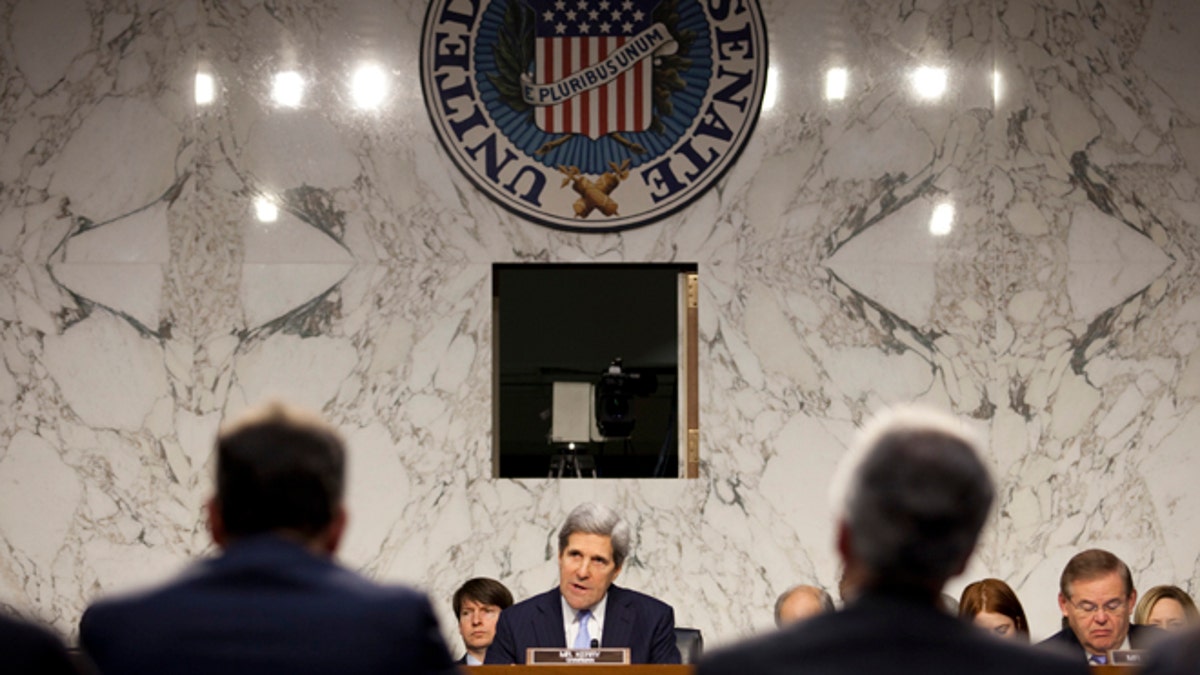
Committee Chairman Sen. John Kerry (D-MA) (C) questions witnesses Deputy Secretary of State William Burns (R) and Deputy Secretary of State for Management and Resources Thomas Nides. (2012 Getty Images)
Sen. John Kerry met secretly with Cuba’s foreign minister in 2010 to discuss the release of jailed American contractor Alan Gross, according to a report published by Foreign Affairs magazine.
The recently nominated secretary of state held a meeting with Cuban Foreign Minister Bruno Rodríguez for what was a failed bid to have Gross released from a Cuban prison. Gross was setting up wireless Internet connections for Cuba’s Jewish community as a subcontractor for USAID, the U.S. government agency in charge of foreign economic development, where he was arrested in December 2009.
The project he was working on was part of a $40 million-a-year program to promote democracy.
U.S. officials have portrayed the work as purely humanitarian. But Gross was violating Cuban law by doing work for USAID in the country, since under Cuban law such activities must be authorized.
The goal right now is to make Cubans understand that Alan Gross to them is no good.
Foreign Minister Rodríguez also met with another senior state department official to discuss Gross, but the talks went nowhere when Rodríguez berated the U.S. official for an hour.
The report also includes a number of details of the U.S.’s effort to free Gross by scaling back its pro-democracy campaign waged on the communist-run nation and attempting to take a less provocative approach toward Cuba.
One of these meetings was brokered by the Spanish government and included then-Assistant Secretary of State Arturo Valenzuela and Rodríguez to discuss Gross’ release, according to the author of the report, R.M Schneiderman, an editor at Newsweek.
“The Cubans were far less flexible than the Americans expected. The U.S…. wanted Cuba to release Gross, and only then would it press ahead on any other policy changes,” he wrote. “Rodríguez allegedly lectured Valenzuela for roughly an hour on Cuba’s history of grievances.”
Kerry met a month later with Rodríguez at the home of Cuba’s ambassador to the United Nations in New York at the behest of Cuban diplomats in Washington and with State Department approval.
President Barack Obama nominated Kerry as his new secretary of state in late December, succeeding Hillary Clinton.
"In a sense, John's entire life has prepared him for this role," Obama said at the White House with the nominee at his side.
The 69-year-old Kerry was the Democratic presidential candidate in 2004 and currently chairs the Senate Foreign Relations Committee. The son of a diplomat, he spent much of his youth abroad and served with the U.S. military in Vietnam.
Obama said he believes the Senate will rapidly confirm Kerry's nomination, adding that as secretary of state he will have "great challenges" ahead of him.
Kerry has been on Washington’s staunchest opponents of the U.S.’s pro-democracy efforts on the island that include beaming anti-Castro messages to Cubans and funding dissident groups. Kerry has also has also favored lifting a U.S. travel restriction to the country and opening tourism to the country – which is one of Cuba’s main sources of revenue.
However some experts have warned that even with Kerry's stance toward Cuba, there won't be sea change in U.S. policy toward the island.
"Maybe there will be an expansion of the scope in some of the initiatives that the U.S. government has already opened," said Christopher Sabatini, the senior policy director at the Council of the Americas. "The focus should be less about regime change and more about expanding the people-to-people contact with Cubans."
While Kerry’s appointment could herald some change in U.S.-Cuban relations it will not be an easy one, as there are still many opponents to the loosening of restrictions with Cuba. If New Jersey Sen. Bob Menendez takes over the Senate Committee on Foreign Relations from Kerry, the new secretary of state will a face Cuban-American who favors buckling down on Cuba instead of loosening up.
There are are rumors that Menendez has promised to help speed the Massachusetts senators appointment if Kerry promises to not broach the topic of the decades old U.S. embargo on Cuba that Menendez vehemently supports.
"Kerry has to get past Menendez and we all know where he stands on these things," Sabatini said.
In terms of Gross’ release, Cuba has said it is willing to negotiate the Americans release in a prisoner swap for the so-called “Cuban Five” – a group of Cuban intelligence officers serving time in U.S. prisons. One of the group's members, René González, was released in October 2011 after serving 13 years of his sentence and a further 3 years of probation in the US.
The Obama administration has said that this is not going to happen and that Gross – unlike the “Cuban Five” – is not a spy and was arrested for breaking Cuban law.
Cuba stated that it will not release Gross unless the country gets something in return.
"There's not going to be a swap for the Cuban Five," Sabatini said. "The goal right now is to make Cubans understand that Alan Gross to them is no good."
Efe contributed reporting to this article.







































